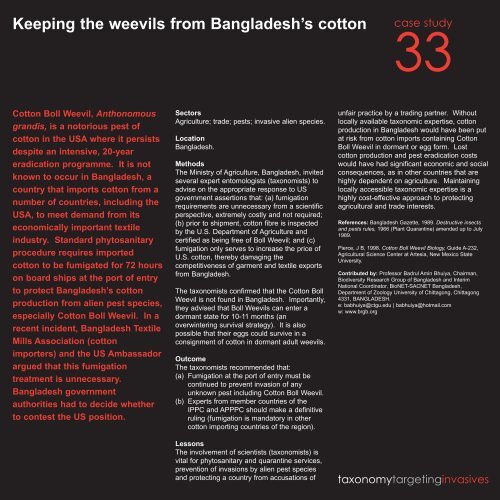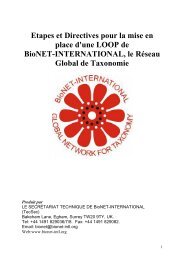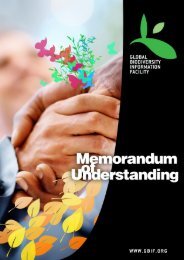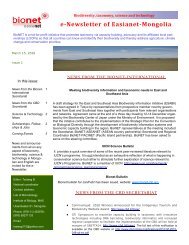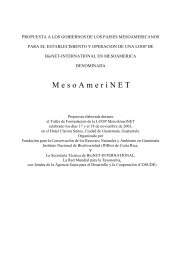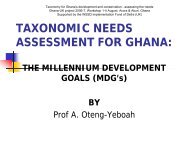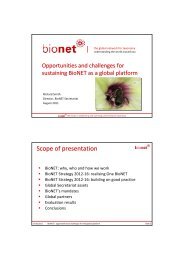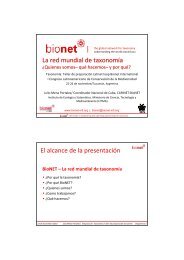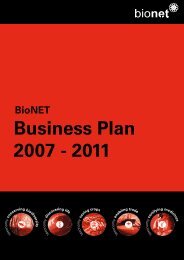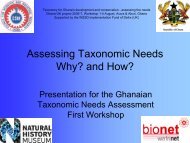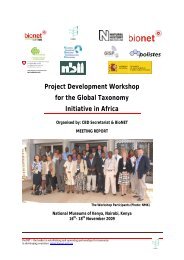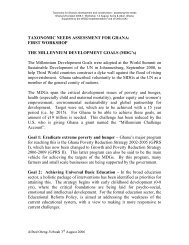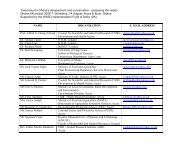Bio cover - BioNET
Bio cover - BioNET
Bio cover - BioNET
You also want an ePaper? Increase the reach of your titles
YUMPU automatically turns print PDFs into web optimized ePapers that Google loves.
Keeping the weevils from Bangladesh’s cottoncase study33Cotton Boll Weevil, Anthonomousgrandis, is a notorious pest ofcotton in the USA where it persistsdespite an intensive, 20-yeareradication programme. It is notknown to occur in Bangladesh, acountry that imports cotton from anumber of countries, including theUSA, to meet demand from itseconomically important textileindustry. Standard phytosanitaryprocedure requires importedcotton to be fumigated for 72 hourson board ships at the port of entryto protect Bangladesh’s cottonproduction from alien pest species,especially Cotton Boll Weevil. In arecent incident, Bangladesh TextileMills Association (cottonimporters) and the US Ambassadorargued that this fumigationtreatment is unnecessary.Bangladesh governmentauthorities had to decide whetherto contest the US position.SectorsAgriculture; trade; pests; invasive alien species.LocationBangladesh.MethodsThe Ministry of Agriculture, Bangladesh, invitedseveral expert entomologists (taxonomists) toadvise on the appropriate response to USgovernment assertions that: (a) fumigationrequirements are unnecessary from a scientificperspective, extremely costly and not required;(b) prior to shipment, cotton fibre is inspectedby the U.S. Department of Agriculture andcertified as being free of Boll Weevil; and (c)fumigation only serves to increase the price ofU.S. cotton, thereby damaging thecompetitiveness of garment and textile exportsfrom Bangladesh.The taxonomists confirmed that the Cotton BollWeevil is not found in Bangladesh. Importantly,they advised that Boll Weevils can enter adormant state for 10-11 months (anoverwintering survival strategy). It is alsopossible that their eggs could survive in aconsignment of cotton in dormant adult weevils.OutcomeThe taxonomists recommended that:(a) Fumigation at the port of entry must becontinued to prevent invasion of anyunknown pest including Cotton Boll Weevil.(b) Experts from member countries of theIPPC and APPPC should make a definitiveruling (fumigation is mandatory in othercotton importing countries of the region).LessonsThe involvement of scientists (taxonomists) isvital for phytosanitary and quarantine services,prevention of invasions by alien pest speciesand protecting a country from accusations ofunfair practice by a trading partner. Withoutlocally available taxonomic expertise, cottonproduction in Bangladesh would have been putat risk from cotton imports containing CottonBoll Weevil in dormant or egg form. Lostcotton production and pest eradication costswould have had significant economic and socialconsequences, as in other countries that arehighly dependent on agriculture. Maintaininglocally accessible taxonomic expertise is ahighly cost-effective approach to protectingagricultural and trade interests.References: Bangladesh Gazette, 1989. Destructive insectsand pests rules, 1966 (Plant Quarantine) amended up to July1989.Pierce, J B, 1998. Cotton Boll Weevil <strong>Bio</strong>logy, Guide A-232,Agricultural Science Center at Artesia, New Mexico StateUniversity.Contributed by: Professor Badrul Amin Bhuiya, Chairman,<strong>Bio</strong>diversity Research Group of Bangladesh and InterimNational Coordinator, <strong>Bio</strong>NET-SACNET Bangladesh,Department of Zoology University of Chittagong, Chittagong4331, BANGLADESH.e: babhuiya@ctgu.edu | babhuiya@hotmail.comw: www.brgb.orgtaxonomytargetinginvasives


